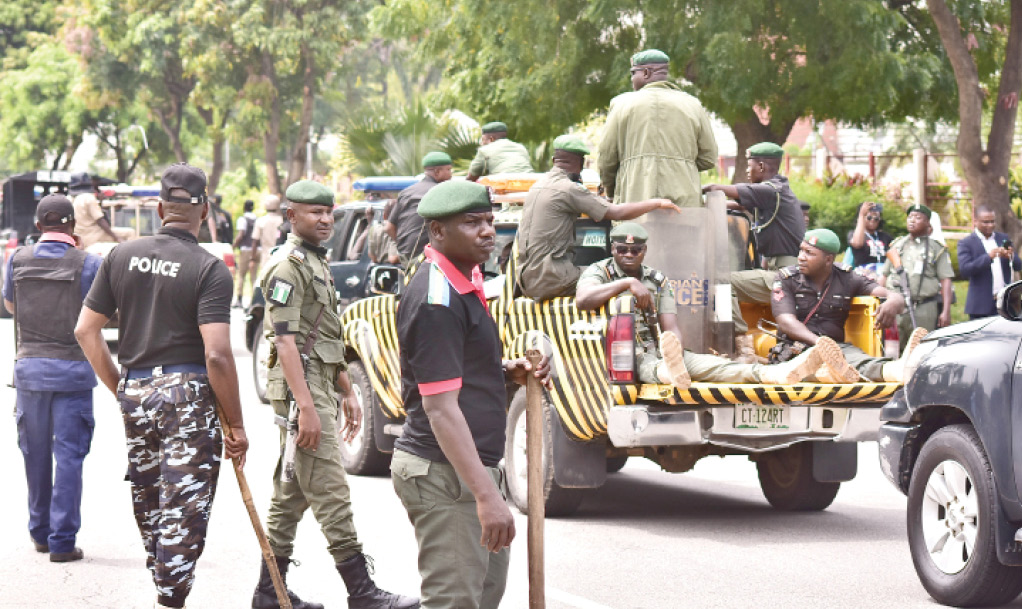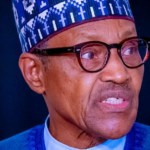As the 2023 general elections draw nearer, no fewer than 14 arms-bearing security agencies in the country are already warming up to perform their constitutional responsibilities with a view to paving way for free, fair and credible polls.
The elections are expected to be unique considering the usage of the newly signed Electoral Act.
- 2023 presidency: APC to rake in N2bn as Lawan, Olawepo-Hashim, others pick forms
- It’s disingenuous denying South a shot at presidency in 2023 — Akeredolu
As the Electoral Act throws up new challenges for political appointees, it also ushered in new challenges for security forces as well as the anti-graft agencies.
For instance, the Economic and Financial Crimes Commission (EFCC) and the Independent Corrupt Practices and Other Related Offences Commission (ICPC) have cosmic tasks in taming financial fraud during campaigns.
Specifically, the two agencies have been charged by the Act to monitor politicians’ campaign spending.
Thus, heads of these agencies have, therefore, commenced plans to re-train their personnel in order to meet up with the new guidelines.
Other security agencies are expected to be actively involved in the electioneering processes and the main election. However, all eyes are more on the police, basically because of its main mandate of maintaining internal security before, during and after the elections in the country.
Anxiety thickens
Recently, prominent Nigerians had raised concerns and expressed fears that 2023 elections might not hold due to growing insecurity in the country, particularly in the North West and South East.
Those who expressed fears include a former Chairman of the Independent National Electoral Commission (INEC), Attahiru Jega; a chieftain of the ruling All Progressives Congress, Jonathan Vatsa; the General Overseer of the Redeemed Christian Church of God (RCCG), Pastor Enoch Adejare Adeboye and the Sultan of Sokoto, Alhaji Sa’ad Abubakar III.
Adeboye had said, “I am not a politician and I am not hoping to become one in the future. I am called to be a pastor, but if you want to quote me, please quote me correctly. As I speak, God has not told me if there will be an election in 2023 or not.
“The year 2023 is still far away from now; He may decide to speak tomorrow, but as of now, he has not told me anything about 2023.”
In the same vein, Sultan said, “A lot of people have been arrested over banditry and terrorism, but how many of them have been jailed or executed? These people have killed thousands of people.
“Unless we all speak up and tell one another the truth, there may be no Nigeria even in 2023. We don’t pray so.”
But the Independent National Electoral Commission (INEC) insisted that no amount of security challenges would stop the conduct of the 2023 general election.
The Chairman of INEC, Prof. Mahmood Yakubu, said in Abuja during the public presentation of the 2022-2026 strategic plan and the 2023 Election Project Plan that the elections would hold as scheduled.
“We are also aware of the security challenges and their impact on the electoral process. We will continue to engage early and intensely with the security agencies to ensure the safety of our personnel and materials, accredited observers and the media and, above all, the voters.”
Security challenges persist in six geo-political zones
Today, virtually all the six geo-political zones are battling one or two security challenges – a situation, stakeholders described as ‘’worrisome’’.
In the North West, activities of bandits and terrorists are still entrenched in the places like Zamfara, Kaduna, Katsina and Sokoto and the security agencies are battling to contain the dastardly acts of the criminals.
Similar incidents are yet to abate in the North East, which has been ravaged by activities of the insurgents in the last 10 years.
A few days ago, an explosion rocked some parts of Taraba, Adamawa and Yobe States.
Members of Islamic State West Africa Province (ISWAP), a breakaway faction of Boko Haram terrorists have also held sway in some parts of Borno State.
The story is not different in the North Central zone, particularly Niger and Kogi where bandits are launching a series of attacks on innocent villagers and other citizens. Various clashes have also refused to cease in Plateau State – the development that had claimed scores of lives recently.
In the Southern region, different threats have continued to grow on a daily basis. For instance, in the South East, agitations of members of Indigenous People of Biafra (IPOB) and its armed wing, Eastern Security Network (ESN) continue to threaten the forthcoming election.
In the same vein, despite the creation of Amotekun in the South-West, a series of cult clashes in that Yoruba-speaking part of the country, appear to be a threat to the forthcoming exercise in the zone.
In the South South zone, crude oil thieves have reportedly laid siege on many creeks. This development, according to a Navy personnel, who does not want his name in print, may affect the distribution of election materials to citizens living at the back of water bodies.
Proposing actions to take, the Executive Director of the Centre for Transparency Advocacy, Mrs Faith Nwadishi, charged the personnel of police to begin gathering intelligence now before the election comes.
‘‘The police must be ready to carry out the election duties, which is majorly on protection of lives and property because election is a civil activity.
‘‘For them to be able to ward off the criminals, they have to be emotionally prepared. And the police authority must ensure that their welfare is taken care of. They have to also be trained well on election duties and what they had to do.
‘‘One other challenge they have, is the problem of transferring of police officers. What happens is that on election day, you transfer people to different places and we had a situation where DPOs are changed at the last minute.
‘‘And when you send people who are not conversant with a particular area, they are not going to the police. Because a lot of work of policing is about intelligence gathering. If you deploy someone to a place he or she is not familiar with, there is a limit to the volume of intelligence the person will gather.
‘‘But if the person who has been in an area and understands the terrain and trends is deployed, what he or she needs to do is to be able to sustain it and it helps that person to deliver more.
‘‘In such instance, that person’s capacity can be used to gather relevant information and the type of crimes and the people who are involved such that when new people come to that area, they know that strangers have come to that area.
What government should do – Intelligence experts
A retired air force officer, Group Captain John Ojikutu, told our correspondent that the government knows what to do if it is ready to get rid of the adversaries.
He said the president should stop treating people feeding on insecurity with kid gloves if he wants free, fair and credible polls in 2023.
“Let’s begin like this. What is the intelligence estimate behind the security or insecurity of this country? What are the things that are causing insecurity? We should find out.
“In terms of Boko Haram, bandits and others; have we been able to identify those behind these bandits and Boko Haram terrorists as well as cattle rustlers? Have we been able to differentiate between them? Who are the people sponsoring them?” Ojikutu queried.
According to him, stopping the earnings of those sponsoring terrorists and other criminals will go a long way because they are the ones fueling various criminalities in the country.
“Those are the things that can cause disruptions in the elections because some people are feeding fat on it. And if the election is going to happen, we can stop or disrupt the sources of their (terrorists) earnings but we have to find out all these.
“What I am saying is that all this fighting against criminals is not going to be successful without getting intelligence.
“As long as we do not have intelligence behind us to find out who are the people sponsoring them, we are not ready. These people are even killing and picking up the operatives, but who are the people behind them?”
Ojikutu, who maintained that the security forces should find every means to identify those sponsoring the terrorists, berated the government for protecting those it claimed to know their identities.
‘‘So, we can’t just be putting soldiers on the road! We are putting soldiers on the road and we are just wasting money for keeping soldiers on the road for more than 10 years. Even before Obasanjo left, we had been fighting all these things and it is escalating everyday. What is it we are doing wrongly?’’
Another intelligence expert and a retired Assistant Director at the Department of State Service (DSS), Mike Ejiofor said since the president had been meeting with the heads of security forces he must have told them the implication of not having election in the country in 2023.
Ejiofor said, ‘’They must have discussed some issues in arming them because he said they must be intelligence and technologically driven. I believe they must have acquired some modern equipment or are in the process of acquiring them. So, when all these things are deployed, I’m sure we will be able to stabilise the polity before the election.’’

 Join Daily Trust WhatsApp Community For Quick Access To News and Happenings Around You.
Join Daily Trust WhatsApp Community For Quick Access To News and Happenings Around You.


